工科
关于工科十大最好专业2023最新
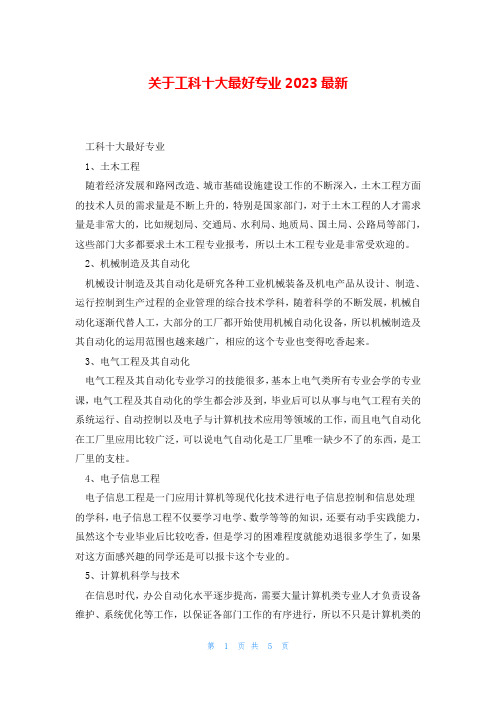
关于工科十大最好专业2023最新工科十大最好专业1、土木工程随着经济发展和路网改造、城市基础设施建设工作的不断深入,土木工程方面的技术人员的需求量是不断上升的,特别是国家部门,对于土木工程的人才需求量是非常大的,比如规划局、交通局、水利局、地质局、国土局、公路局等部门,这些部门大多都要求土木工程专业报考,所以土木工程专业是非常受欢迎的。
2、机械制造及其自动化机械设计制造及其自动化是研究各种工业机械装备及机电产品从设计、制造、运行控制到生产过程的企业管理的综合技术学科,随着科学的不断发展,机械自动化逐渐代替人工,大部分的工厂都开始使用机械自动化设备,所以机械制造及其自动化的运用范围也越来越广,相应的这个专业也变得吃香起来。
3、电气工程及其自动化电气工程及其自动化专业学习的技能很多,基本上电气类所有专业会学的专业课,电气工程及其自动化的学生都会涉及到,毕业后可以从事与电气工程有关的系统运行、自动控制以及电子与计算机技术应用等领域的工作,而且电气自动化在工厂里应用比较广泛,可以说电气自动化是工厂里唯一缺少不了的东西,是工厂里的支柱。
4、电子信息工程电子信息工程是一门应用计算机等现代化技术进行电子信息控制和信息处理的学科,电子信息工程不仅要学习电学、数学等等的知识,还要有动手实践能力,虽然这个专业毕业后比较吃香,但是学习的困难程度就能劝退很多学生了,如果对这方面感兴趣的同学还是可以报卡这个专业的。
5、计算机科学与技术在信息时代,办公自动化水平逐步提高,需要大量计算机类专业人才负责设备维护、系统优化等工作,以保证各部门工作的有序进行,所以不只是计算机类的企业需要计算机类人才,计算机专业的人才在各个都是很吃香的,所以计算机科学与技术这个专业同样是很热门的专业。
6、通信工程通信工程是电子工程的一个重要分支,同时也是其中一个基础学科,毕业生可以在通信领域中从事研究、设计、制造、运营及在国民经济各部门和国防工业中从事开发、应用通信技术与设备,而随着我国通信领域的不断发展,这个专业报考的人数也开始上升。
2023工科最热门的十大专业(工科专业最新排名)
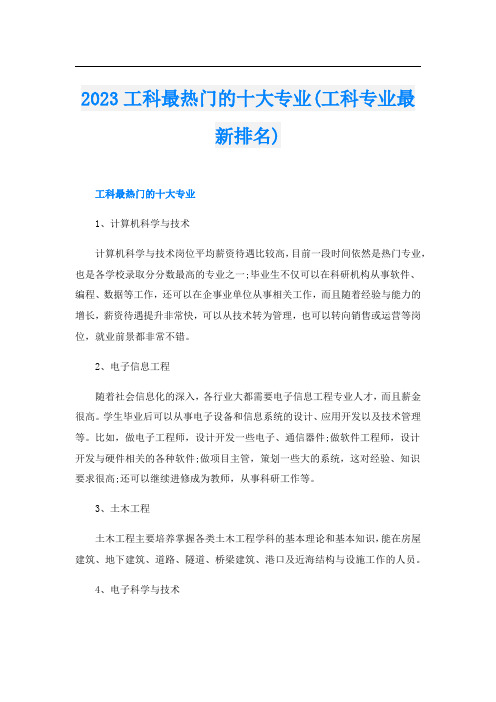
2023工科最热门的十大专业(工科专业最新排名)工科最热门的十大专业1、计算机科学与技术计算机科学与技术岗位平均薪资待遇比较高,目前一段时间依然是热门专业,也是各学校录取分分数最高的专业之一;毕业生不仅可以在科研机构从事软件、编程、数据等工作,还可以在企事业单位从事相关工作,而且随着经验与能力的增长,薪资待遇提升非常快,可以从技术转为管理,也可以转向销售或运营等岗位,就业前景都非常不错。
2、电子信息工程随着社会信息化的深入,各行业大都需要电子信息工程专业人才,而且薪金很高。
学生毕业后可以从事电子设备和信息系统的设计、应用开发以及技术管理等。
比如,做电子工程师,设计开发一些电子、通信器件;做软件工程师,设计开发与硬件相关的各种软件;做项目主管,策划一些大的系统,这对经验、知识要求很高;还可以继续进修成为教师,从事科研工作等。
3、土木工程土木工程主要培养掌握各类土木工程学科的基本理论和基本知识,能在房屋建筑、地下建筑、道路、隧道、桥梁建筑、港口及近海结构与设施工作的人员。
4、电子科学与技术随着社会需求会逐步扩大,电子科学与技术专业总体就业前景看好。
学生毕业后可以面向微电子、测控等相关领域的科研院所或者是在高等学校从事研究和科研教学等工作,公司或企业的集成电路设计或者是测控仪器软硬件设计等生产管理工作也能胜任,而且由于学习了计算机相关知识,也可以从事软件开发等工作,未来的就业方向非常宽泛。
5、通信工程通信工程专业属于电子信息类,主要涉及电子科学与技术、信息与通信工程和光学工程等学科领域的理论,同时以数学、物理和信息论为基础,应用领域广泛、发展迅速,像我们平时常说的光纤、卫星、移动通信等都属于该专业的范畴。
该专业的就业面也比较广,毕业生主要在信息和通信技术相关企业,如移动、联通、电信、华为、中兴等公司以及互联网、银行、电力、交通、航空航天等行业从事通信系统与工程的设计、集成以及开发等工作。
6、机械设计制造及其自动机械设计制造及其自动主要培养适应社会发展需要,具备较扎实的自然科学基础和宽厚的机械专业知识以及较强的实践能力,具有创新意识、国际视野、团队合作精神和良好的沟通能力,具有较好的人文社会科学素养、较强的社会责任感、良好的职业道德,能在机械工程领域从事机械产品研发、设计、制造、项目管理等工作的复合型工程技术人才。
盘点2023工科十大热门专业
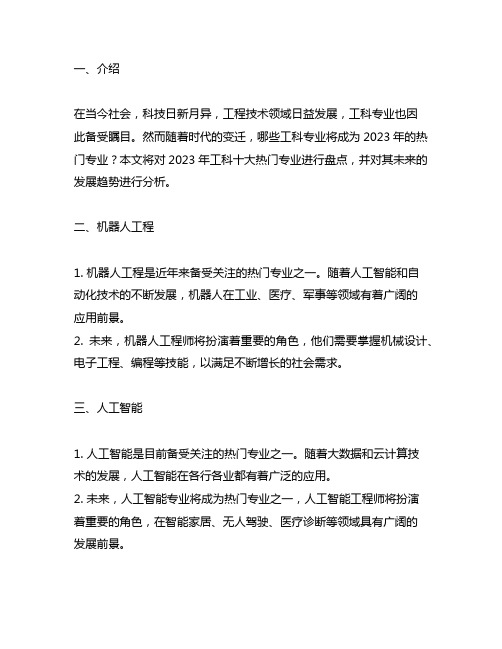
一、介绍在当今社会,科技日新月异,工程技术领域日益发展,工科专业也因此备受瞩目。
然而随着时代的变迁,哪些工科专业将成为2023年的热门专业?本文将对2023年工科十大热门专业进行盘点,并对其未来的发展趋势进行分析。
二、机器人工程1. 机器人工程是近年来备受关注的热门专业之一。
随着人工智能和自动化技术的不断发展,机器人在工业、医疗、军事等领域有着广阔的应用前景。
2. 未来,机器人工程师将扮演着重要的角色,他们需要掌握机械设计、电子工程、编程等技能,以满足不断增长的社会需求。
三、人工智能1. 人工智能是目前备受关注的热门专业之一。
随着大数据和云计算技术的发展,人工智能在各行各业都有着广泛的应用。
2. 未来,人工智能专业将成为热门专业之一,人工智能工程师将扮演着重要的角色,在智能家居、无人驾驶、医疗诊断等领域具有广阔的发展前景。
1. 新能源工程是备受关注的热门专业之一。
随着全球能源危机的日益突出,新能源技术的发展变得尤为重要。
2. 未来,新能源工程专业将成为热门专业之一,专业人才将参与太阳能、风能、地热能等新能源技术的开发和应用。
五、智能制造1. 智能制造是备受关注的热门专业之一。
随着工业4.0的推进,智能制造技术在制造业领域发挥着重要作用。
2. 未来,智能制造专业将成为热门专业之一,智能制造工程师将具有丰富的机械设计、自动化控制、信息技术等方面的知识,在智能工厂建设和智能制造系统的研发与应用方面拥有广阔的发展空间。
六、网络安全1. 网络安全是备受关注的热门专业之一。
随着互联网的飞速发展,网络安全问题也日益突出。
2. 未来,网络安全专业将成为热门专业之一,网络安全工程师将扮演着重要的角色,需要具备网络安全技术、信息安全管理、风险评估等方面的知识,保障网络信息的安全。
1. 航空航天工程是备受关注的热门专业之一。
随着航空航天技术的不断发展,航空航天工程专业也备受青睐。
2. 未来,航空航天工程专业将成为热门专业之一,航空航天工程师将具有丰富的航空航天知识,参与航空器设计、航天器研发等方面的工作,具有广阔的发展前景。
工科有哪些科
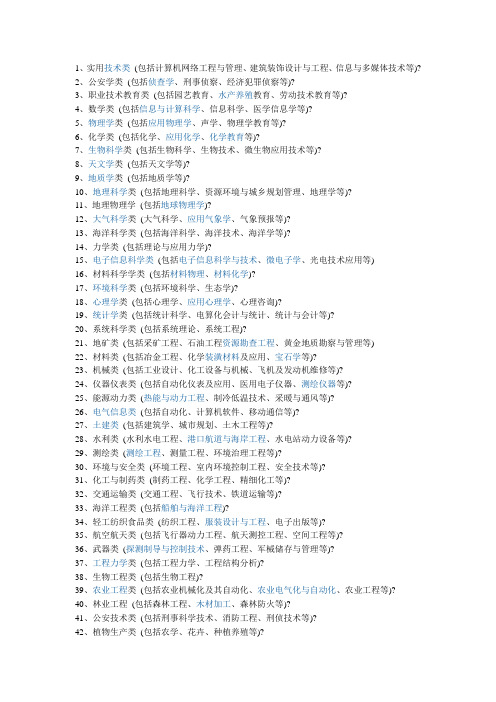
1、实用{HYPERLINK "/z/Search.e?sp=S技术类&ch=w.search.yjjlink&cid=w.search.yjjlink"|技术类(包括计算机网络工程与管理、建筑装饰设计与工程、信息与多媒体技术等)?2、公安学类(包括、刑事侦察、经济犯罪侦察等)?3、职业技术教育类(包括园艺教育、教育、劳动技术教育等)?4、数学类(包括、信息科学、医学信息学等)?5、类(包括、声学、物理学教育等)?6、化学类(包括化学、、等)?7、类(包括生物科学、生物技术、微生物应用技术等)?8、类(包括天文学等)?9、类(包括地质学等)?10、类(包括地理科学、资源环境与城乡规划管理、地理学等)?11、地理物理学(包括)?12、类(大气科学、、气象预报等)?13、海洋科学类(包括海洋科学、海洋技术、海洋学等)?14、力学类(包括理论与应用力学)?15、(包括、、光电技术应用等)16、材料科学学类(包括、)?17、类(包括环境科学、生态学)?18、类(包括心理学、、心理咨询)?19、类(包括统计科学、电算化会计与统计、统计与会计等)?20、系统科学类(包括系统理论、系统工程)?21、地矿类(包括采矿工程、石油工程、黄金地质勘察与管理等)22、材料类(包括冶金工程、化学及应用、等)?23、机械类(包括工业设计、化工设备与机械、飞机及发动机维修等)?24、仪器仪表类(包括自动化仪表及应用、医用电子仪器、等)?25、能源动力类(、制冷低温技术、采暖与通风等)?26、(包括自动化、计算机软件、移动通信等)?27、(包括建筑学、城市规划、土木工程等)?28、水利类(水利水电工程、、水电站动力设备等)?29、测绘类(、测量工程、环境治理工程等)?30、环境与安全类(环境工程、室内环境控制工程、安全技术等)?31、化工与制药类(制药工程、化学工程、精细化工等)?32、交通运输类(交通工程、飞行技术、铁道运输等)?33、海洋工程类(包括)?34、轻工纺织食品类(纺织工程、、电子出版等)?35、航空航天类(包括飞行器动力工程、航天测控工程、空间工程等)?36、武器类(、弹药工程、军械储存与管理等)?37、类(包括工程力学、工程结构分析)?38、生物工程类(包括生物工程)?39、类(包括农业机械化及其自动化、、农业工程等)?40、林业工程(包括森林工程、、森林防火等)?41、公安技术类(包括刑事科学技术、消防工程、刑侦技术等)?42、植物生产类(包括农学、花卉、种植养殖等)?43、类(包括商品花卉、园林花卉技术、种子种苗等)?44、森林资源类(包括林学、、生态旅游管理等)?45、环境生态类(包括园林、风景园林、环境保护等)?46、动物生产类(包括动物科学、经济动物、养殖技术等)?47、(包括动物、畜牧兽医、动植物检疫等)?48、水产类(包括、名特水产养殖、资源与渔政管理等)?49、类(包括基础医学)?50、预防医学类(包括预防医学、卫生检验、妇幼卫生等)?51、临床医学与医学技术类(包括美容医学、医学检验、高级助产等)?52、类(包括口腔医学、口腔修复工艺学等)?53、类(包括法医学)?54、类(包括护理学、高级护理、中西药结合护理等)?55、类(包括农业经济管理、林业经济管理、乡镇建设与管理)提问。
新工科的十大特点
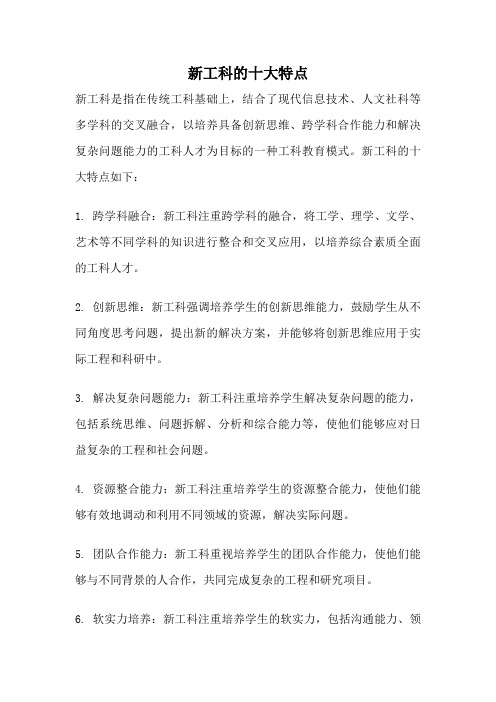
新工科的十大特点新工科是指在传统工科基础上,结合了现代信息技术、人文社科等多学科的交叉融合,以培养具备创新思维、跨学科合作能力和解决复杂问题能力的工科人才为目标的一种工科教育模式。
新工科的十大特点如下:1. 跨学科融合:新工科注重跨学科的融合,将工学、理学、文学、艺术等不同学科的知识进行整合和交叉应用,以培养综合素质全面的工科人才。
2. 创新思维:新工科强调培养学生的创新思维能力,鼓励学生从不同角度思考问题,提出新的解决方案,并能够将创新思维应用于实际工程和科研中。
3. 解决复杂问题能力:新工科注重培养学生解决复杂问题的能力,包括系统思维、问题拆解、分析和综合能力等,使他们能够应对日益复杂的工程和社会问题。
4. 资源整合能力:新工科注重培养学生的资源整合能力,使他们能够有效地调动和利用不同领域的资源,解决实际问题。
5. 团队合作能力:新工科重视培养学生的团队合作能力,使他们能够与不同背景的人合作,共同完成复杂的工程和研究项目。
6. 软实力培养:新工科注重培养学生的软实力,包括沟通能力、领导能力、创业精神等,使他们在职业发展中具备竞争力。
7. 实践教学:新工科注重将理论知识与实践相结合,通过实验、实习、项目等实践教学活动,培养学生的实际操作能力。
8. 跨界创新:新工科鼓励学生在不同领域进行跨界创新,将工程技术与艺术、设计、文化等领域相结合,推动技术创新和社会发展。
9. 社会责任感:新工科注重培养学生的社会责任感,使他们在工作中能够关注社会问题,积极参与社会公益活动,并为社会做出贡献。
10. 国际视野:新工科鼓励学生具备国际化的视野和竞争力,培养他们的跨文化交流能力和全球化思维,以适应全球化的工程和科技发展。
总结起来,新工科强调跨学科融合、创新思维、解决复杂问题能力、资源整合能力、团队合作能力、软实力培养、实践教学、跨界创新、社会责任感和国际视野。
这些特点使得新工科的教育模式更加符合当今社会对工程人才的要求,能够培养具备全面素质和创新能力的工程人才,为社会和经济发展做出贡献。
工科里最好的专业排名是什么

工科里最好的专业排名是什么工科里最好的专业排名1、自动化专业2、机械工程专业3、光学工程专业4、电气工程专业5、软件工程专业6、化学工程与技术专业7、信息与通信工程专业8、土木工程专业9、动力工程及工程热物理专业10、生物医学工程专业工科最难学的三个专业一、自动化专业——一般来说,自动化专业有两个发展的方向:工业过程控制、嵌入式系统;而且不管是哪个方向,涉及的领域都是非常的广的,也因此即便是学霸学起来,都会觉得自己很渣,可以说是真的很难学了。
估计这个专业真的也就只有感兴趣,适合的学生才能学的进去了;毕竟专业和高中的学习不一样,没有人是绝对适合某个领域的,所以选择这个专业的话,一定要考虑清楚;当然付出也有收获,这个专业的就业真的很好,前景也十分的广阔。
二、通信工程类专业——这个专业是电子工程专业的一个重要分支,这个专业同样的涉及的领域也是非常广的,在一定程度上,领域广难度就很大。
因为想要学得好的话,你必须要学的更精一些才行;而且如果想要学着个专业,数学的天赋一定要过硬,因为数学课程就有五门,对于数学无感的人来说,这简直就是灾难了;都知道学数学不能分神,一分神你就不知道老师在说什么了;当然一样的,难学是难学,但是前景好,这类人才确实是非常紧缺的。
三、土木工程类专业——土木工程类专业一直以来都是理科生报考的一个热门专业,而且不同的学校培养得方向不同所以报考的话,要对报考的院校有所了解才可以。
这个专业只所以难学,是因为学习的面很广,什么数学物理化学都涉及到了,不仅如此计算机也一定要有所了解;对于对这些课程感到吃力的学生不建议报考;当然,这个专业难学的最关键的一点还不是哪些课程,而是力学和材料,力学很难学是大家都知道的,所以如果没有特别大的兴趣,或者不适合的,还是不要报考了;不过这个专业的对口率很高,很少有学生转行;也因为难学所以这个专业对于毕业生的待遇和前景都还是很好的。
工科什么专业前景好工科热门专业1:计算机科学与技术专业工科计算机科学与技术主要学习计算机科学与技术包括计算机硬件、软件与应用的基本理论、基础知识和基本技能与方法,接受从事计算机应用开发和研究能力的基本训练等。
大学_工科专业有哪些专业

工科专业有哪些专业工科类是指哪些专业:1. 地矿类:采矿工程;石油工程;矿物加工工程;勘查技术与工程;资源勘查工程.黄金地质勘察与管理2. 材料类:冶金工程;金属材料工程;无机非金属材料工程;高分子材料与工程.化学装潢材料及应用、宝石学3. 机械类:机械设计制造及其自动化;材料成型及控制工程;工业设计;过程装备与控制工程,化工设备与机械、飞机及发动机维修4.仪器仪表类:测控技术与仪器.自动化仪表及应用、医用电子仪器、测绘仪器5. 能源动力类:核工程与核技术. 热能与动力工程、制冷低温技术、采暖与通风6. 电气信息类:电气工程及其自动化;自动化;电子信息工程;通信工程;计算机科学与技术;. 软件工程.7. 土建类:建筑学;城市规划;土木工程;建筑环境与设备工程;给水排水工程. 景观设计. 工程造价. 工程管理.8. 水利类:水利水电工程;水文与水资源工程;港口航道与海岸工程9. 测绘类:测绘工程. 测量工程、环境治理工程.10. 环境与安全类:环境工程;安全工程. 室内环境控制工程11. 化工与制药类:化学工程与工艺;制药工程. 精细化工12. 交通运输类:交通运输;交通工程;车辆工程. 油气储运工程;航海工程;航海技术;轮机工程. 铁道运输13. 海洋工程类:船舶与海洋工程14. 轻工纺织食品类:食品科学与工程;轻化工程;包装工程;印刷工程;纺织工程;服装设计与工程15. 航空航天类:飞行器设计与工程;飞行器动力工程;飞行器制造工程;飞行器环境与生命保障工程. 航天测控工程、空间工程16.武器类:武器系统与发射工程;探测制导与控制技术;弹药工程与爆炸技术;特种能源工程与烟火技术;地面武器机动工程;信息对抗技术. 、军械储存与管理17. 工程力学类:工程力学. 工程结构分析18. 生物工程类:生物工程.生物医学工程19. 农业工程类:农业机械化及其自动化;农业电气化与自动化;农业建筑环境与能源工程;农业水利工程20. 林业工程类:森林工程;木材科学与工程;林产化工.21. 公安技术类:刑事科学技术;消防工程. 刑侦技术等22、公安学类 (包括侦查学、刑事侦察、经济犯罪侦察等)23. 实用技术类 (包括计算机网络工程与管理、建筑装饰设计与工程、信息与多媒体技术等)工科专业有哪些专业:工科包括仪器仪表、能源动力、电气信息、交通运输、海洋工程、轻工纺织、航空航天、工程力学、生物工程、农业工程、林业工程、公安技术、植物生产、地矿、材料、机械、食品、武器、土建、水利、测绘、环境与安全、化工与制药、包装工程、印刷工程等21个学科类,其中一共有79个本科专业。
工科各大专业详细解读(精选5篇)

工科各大专业详细解读(精选5篇)工科各大专业详细解读(精选篇1)1、计算机科学与技术专业:女生其实学这个专业的人数非常多,因为计算机类专业适合女生的岗位很多,基本上在各个领域都有适合的岗位,同样也是转行比较容易的一个学科。
甚至很多岗位更青睐招收计算机专业毕业的女生。
同时计算机专业不会过时,是一个适应性非常广的学科,除了有一定难度之外,女生报考并不比男生差,感兴趣的女生可以参考。
2、电气工程及其自动化专业:这个专业男女比例虽然差别较大,但并不会很夸张,每年报考的女生人数也不少。
一方面是这类专业适合的领域很广,只要是和石油、化工、冶金、电力、电子、通信等行业相关的,都是有适合的岗位的,即便是这些行业女生都不多,但多少都有适合女生的职业。
当然最好的就是进入国家电网,也是最对口的。
工科各大专业详细解读(精选篇2)1、地矿类专业:在地质部门、有关矿业部门和工程建设部门的企业、研究院工作。
2、材料类专业:到冶金、化工等部门的材料研究、设计、生产单位工作。
3、机械类专业:机械行业的研究、设计、制造工作,以及在其各行各业的机械设计、制造、使用部门工作。
4、仪器仪表类专业:服务于仪器仪表的研究、设计、制造部门,从事有关仪器仪表的使用、维修和改进等工作。
5、电气信息类专业:适合到电力、机电、铁道等部门从事科研、新技术开发和应用等工作。
6、电子信息工程类专业:适合到电子行业、广播电视等部门从事设备制造及原材料的开发研制、生产管理等工作。
7、通信工程类专业:适合到各邮电管理局及公司从事科研、技术开发、经营及管理工作,也可到军队、铁路、电力等部门从事相应的工作。
8、计算机科学与技术类专业:适合到各系统或行业的相关部门从事软件开发、经营和维护。
9、土建类专业:适合到建筑部门或铁道、交通、工矿、国防和房地产开发公司及建筑设计院、规划局等部门从事研究、设计、施工、管理和经营等工作。
10、水利类专业:去水利规划、水利工程建设部门工作。
工科专业的分类

工科专业有以下几类:工学 > 地矿类> 采矿工程石油工程矿物加工工程勘察技术与工程资源勘察工程地质工程矿物资源工程材料类> 冶金工程金属材料工程无机非金属材料工程高分子材料与工程材料科学与工程复合材料与工程机械类> 机械设计制造及其自动化材料成型及控制工程工业设计过程装备与控工程车辆工程机械工程及自动化仪器仪表类> 测控技术与仪器能源动力类> 热能与动力工程核工程与核技术能源与环境系统工程电气信息类> 自动化电子信息工程通信工程计算机科学与技术生物医学工程电气工程与自动化信息工程土建类> 建筑学城市规划土木工程建筑环境与设备工程给排水工程土木工程水利类> 水利水电工程水文与水资源工程港口航道与海岸工程测绘类> 测绘工程环境与安全类> 环境工程安全工程化学与制药类> 化学工程与工艺制药工程交通运输类> 交通运输交通工程油气储运工程飞行技术航海技术轮机工程海洋工程类> 船舶与海洋工程轻工纺织食品类> 食品科学与工程轻化工程包装工程印刷工程纺织工程服装设计与工程航空航天类> 飞行器设计与工程飞行器动力工程飞行器制造与工程飞行器环境与生命保障工程武器类> 武器系统与发射工程探测指导与控制技术弹药工程与爆炸技术特种能源工程与烟火技术地面武器机动工程信息对抗技术武器系统与工程工程力学类> 工程力学生物工程类> 生物工程农业工程类> 农业机械化及其自动化农业电气化与自动化农业建筑环境与能源工程林业工程类> 森林工程木材科学与工程林产化工公安技术类> 刑事科学技术消防工程管理学 > 管理科学与工程类> 管理科学信息管理与信息系统工业工程工程管理工商管理类> 工商管理市场营销会计学财务管理人力资源管理旅游管理物流管理公共管理类> 行政管理公共事业管理劳动与社会保障土地资源管理农业经济管理类> 农林经济管理农村区域发展图书档案学类> 图书馆学档案学获得工学学士学位意味着你需要本科学习以上某类专业并且获得工学学士学位证书。
大学工科类专业名单(15大类)

大学工科类专业名单(15大类)大学工科类专业名单1、地矿类:在地质部门、有关矿业部门和工程建设部门的企业、研究院工作。
2、材料类:到冶金、化工等部门的材料研究、设计、生产单位工作。
3、机械类:机械行业的研究、设计、制造工作,以及在其各行各业的机械设计、制造、使用部门工作。
4、仪器仪表类:服务于仪器仪表的研究、设计、制造部门,从事有关仪器仪表的使用、维修和改进等工作。
5、电气信息类:适合到电力、机电、铁道等部门从事科研、新技术开发和应用等工作。
6、电子信息工程类:适合到电子行业、广播电视等部门从事设备制造及原材料的开发研制、生产管理等工作。
7、通信工程类:适合到各邮电管理局及公司从事科研、技术开发、经营及管理工作,也可到军队、铁路、电力等部门从事相应的工作。
8、计算机科学与技术类:适合到各系统或行业的相关部门从事软件开发、经营和维护。
9、土建类:适合到建筑部门或铁道、交通、工矿、国防和房地产开发公司及建筑设计院、规划局等部门从事研究、设计、施工、管理和经营等工作。
10、水利类:去水利规划、水利工程建设部门工作。
也可以到建筑、铁路、交通等部门从事相应的工作。
11、测绘类:到专业测绘部门和工农业规划、城市规划、国防建设等部门从事测绘工作。
12、化工与制药类:到化学、制药工业的生产、设计、科研等部门从事化学和制药工程、工艺及产品的制造、开发和设计等工作。
13、交通运输类:到铁路、公路、水运等单位从事各类运输及其设备研究、生产及管理工作。
14、农业工程类:到农牧渔业部门及乡镇企业,从事生产管理及现代化农业中各种工程措施的开发设计、管理等。
15、林业工程类:到林业部门设计、研究机构中的生产组织管理、工程设计、新技术的开发和经营等。
工科专业就业前景现在国家普遍注重工学人才,毕竟新型工业化国家,对工学人才的需求很大,国家和经济的建设,实际还是要落实到技术,工学与理学文学相比,更具有实用性,因此就业也更容易,更广泛,不过工学大多需要脑力,体力和实践相结合,因此,男生选择工学的比例相对较大。
什么是理科,什么是工科有什么区别分别有哪些专业
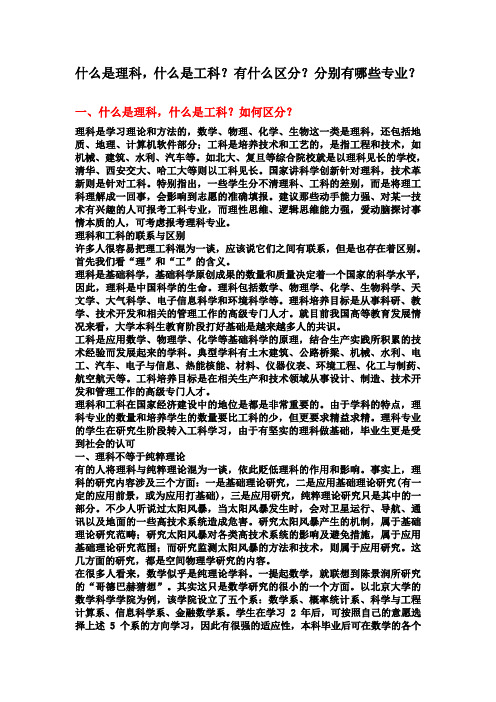
什么是理科,什么是工科?有什么区分?分别有哪些专业?一、什么是理科,什么是工科?如何区分?理科是学习理论和方法的,数学、物理、化学、生物这一类是理科,还包括地质、地理、计算机软件部分;工科是培养技术和工艺的,是指工程和技术,如机械、建筑、水利、汽车等。
如北大、复旦等综合院校就是以理科见长的学校,清华、西安交大、哈工大等则以工科见长。
国家讲科学创新针对理科,技术革新则是针对工科。
特别指出,一些学生分不清理科、工科的差别,而是将理工科理解成一回事,会影响到志愿的准确填报。
建议那些动手能力强、对某一技术有兴趣的人可报考工科专业,而理性思维、逻辑思维能力强,爱动脑探讨事情本质的人,可考虑报考理科专业。
理科和工科的联系与区别许多人很容易把理工科混为一谈,应该说它们之间有联系,但是也存在着区别。
首先我们看“理”和“工”的含义。
理科是基础科学,基础科学原创成果的数量和质量决定着一个国家的科学水平,因此,理科是中国科学的生命。
理科包括数学、物理学、化学、生物科学、天文学、大气科学、电子信息科学和环境科学等。
理科培养目标是从事科研、教学、技术开发和相关的管理工作的高级专门人才。
就目前我国高等教育发展情况来看,大学本科生教育阶段打好基础是越来越多人的共识。
工科是应用数学、物理学、化学等基础科学的原理,结合生产实践所积累的技术经验而发展起来的学科。
典型学科有土木建筑、公路桥梁、机械、水利、电工、汽车、电子与信息、热能核能、材料、仪器仪表、环境工程、化工与制药、航空航天等。
工科培养目标是在相关生产和技术领域从事设计、制造、技术开发和管理工作的高级专门人才。
理科和工科在国家经济建设中的地位是都是非常重要的。
由于学科的特点,理科专业的数量和培养学生的数量要比工科的少,但更要求精益求精。
理科专业的学生在研究生阶段转入工科学习,由于有坚实的理科做基础,毕业生更是受到社会的认可一、理科不等于纯粹理论有的人将理科与纯粹理论混为一谈,依此贬低理科的作用和影响。
工科类招生要求

CHAPTER 05
工科类学生发展
学生综合素质培养
数学、物理基础知识
工科类专业需要学生具备扎实的数学、物理基础知识,以 便更好地理解和应用工程原理。
实验技能
工科类专业注重实验和实践,因此学生需要具备一定的实 验技能,包括实验设计、操作和数据分析等方面的能力。
计算机技术
现代工程中,计算机技术扮演着越来越重要的角色,因此学生 需要掌握基本的计算机技术,如编程、数据结构和算法等。
力学、热学、光学、电磁 学等。
高等数学、线性代数、概 率论与数理统计等。
数学
计算机基础 物理
专业课程设置
机械工程
机械设计、机械制造、材料力学等。
电子工程
电路分析、信号与系统、微பைடு நூலகம்原理等 。
计算机科学与技术
操作系统、数据库原理、计算机网络 等。
实践课程设置
实验课程
根据专业需要设置相应的实验课程,如金工实习 、电子工艺实习等。
工科类招生要求
汇报人:可编辑
2024-01-06
CONTENTS 目录
• 工科类专业介绍 • 工科类招生要求 • 工科类课程设置 • 工科类教学特色 • 工科类学生发展
CHAPTER 01
工科类专业介绍
什么是工科
定义
工科是工程学科的总称,主要涉 及应用数学、物理学、化学等基 础科学原理,结合生产实践所积 累的技术经验而发展起来的学科 。
国际化办学与交流
国际化课程
工科类高校通常引进国外先进的教材和教 学方法,开设国际化课程,帮助学生了解
国际前沿技术和理念。
学生交流项目
工科类高校通常与国外高校建立合作关系 ,开展学生交流项目,为学生提供国际化 的学习环境和交流机会。
专科工科最有前途十大专业

专科工科最有前途十大专业(原创实用版)目录1.前言:介绍专科工科的重要性和前景2.电子信息类专业3.计算机类专业4.土木建筑类专业5.化学工程类专业6.机械工程类专业7.自动化类专业8.环境工程类专业9.材料工程类专业10.食品工程类专业11.结论:总结十大专业对未来就业的影响和重要性正文【前言】随着我国经济的快速发展,科技的进步和社会的需求,工科类专业在高等教育中的地位日益重要。
专科工科作为高等教育的重要组成部分,不仅为社会输送了大量的技术人才,也为国家的经济发展做出了巨大贡献。
本文将介绍当前最有前途的十大专科工科专业,以期为学生和家长在选择专业时提供参考。
【电子信息类专业】电子信息类专业主要培养具备电子技术和信息处理技术的应用型人才。
随着信息技术的迅速发展,电子信息类专业的就业前景十分广阔,包括通信、计算机、家电、智能穿戴等领域。
【计算机类专业】计算机类专业主要培养具备计算机软硬件开发和应用能力的技术人才。
计算机技术已广泛应用于各行各业,使得计算机类专业的就业前景非常乐观,涉及软件开发、网络工程、数据分析等领域。
【土木建筑类专业】土木建筑类专业主要培养具备建筑设计、施工和管理能力的应用型人才。
随着我国城市化进程的推进,土木建筑类专业的就业前景持续向好,涵盖建筑设计、工程管理、市政工程等领域。
【化学工程类专业】化学工程类专业主要培养具备化学工程设计、生产和研究能力的技术人才。
化学工程在能源、环保、新材料等领域具有广泛应用,使得化学工程类专业的就业前景较好,涉及石油化工、环保工程、新材料研发等领域。
【机械工程类专业】机械工程类专业主要培养具备机械设计、制造和维修能力的应用型人才。
机械工程在制造业中具有举足轻重的地位,因此机械工程类专业的就业前景较为稳定,涵盖机械制造、设备维修、产品研发等领域。
【自动化类专业】自动化类专业主要培养具备自动化设备设计、生产和维护能力的技术人才。
自动化技术在工业生产、电力系统等领域具有广泛应用,因此自动化类专业的就业前景较好,涉及工业自动化、机器人技术、智能制造等领域。
专科工科最有前途十大专业

专科工科最有前途十大专业【最新版】目录1.概述2.工程类专业3.专科工科专业前景分析4.最有前途的十大专科工科专业5.结论正文随着科技的不断发展和社会的进步,工程技术类专业在我国的地位日益重要,为广大青年学生提供了丰富的发展机会。
本文旨在分析专科工科专业前景,并列举最有前途的十大专科工科专业。
首先,我们要了解什么是工程类专业。
工程类专业是指那些以工程技术为核心,培养具备工程设计、制造、运行、管理等方面能力的专业。
在我国,工程类专业分为多个领域,如机械、电子、土木、化学、材料等。
专科工科专业前景分析,我们可以从以下几个方面进行:1.国家政策支持:近年来,我国政府高度重视科技创新和产业发展,不断加大对工程技术领域的投入和支持,为专科工科专业发展创造了良好的外部环境。
2.社会需求:随着工业化、信息化、智能化的深入推进,社会对工程技术人才的需求越来越大,专科工科专业毕业生就业前景广阔。
3.技能型人才培养:专科工科专业注重实践能力和技能型人才培养,使毕业生具备较强的动手能力和实际操作能力,更加适应社会和市场的需求。
接下来,我们来看一下最有前途的十大专科工科专业:1.电气自动化技术2.机械设计与制造3.计算机应用技术4.土木工程5.化学工程与工艺6.建筑工程技术7.通信技术8.环境监测与治理技术9.汽车检测与维修技术10.物流管理这些专业涵盖了多个工程领域,既有传统的机械、土木等专业,也有新兴的计算机、通信等专业,为学生提供了多样化的选择。
综上所述,专科工科专业在我国具有较好的发展前景。
最有前途的十大专科工科专业为电气自动化技术、机械设计与制造等。
工科知识入门知识点总结
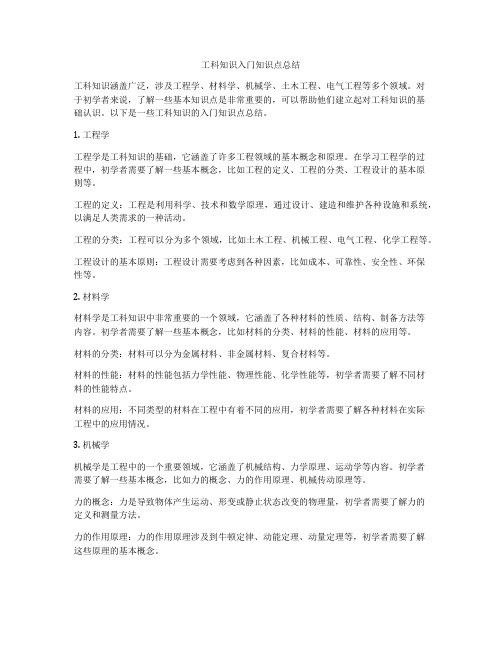
工科知识入门知识点总结工科知识涵盖广泛,涉及工程学、材料学、机械学、土木工程、电气工程等多个领域。
对于初学者来说,了解一些基本知识点是非常重要的,可以帮助他们建立起对工科知识的基础认识。
以下是一些工科知识的入门知识点总结。
1. 工程学工程学是工科知识的基础,它涵盖了许多工程领域的基本概念和原理。
在学习工程学的过程中,初学者需要了解一些基本概念,比如工程的定义、工程的分类、工程设计的基本原则等。
工程的定义:工程是利用科学、技术和数学原理,通过设计、建造和维护各种设施和系统,以满足人类需求的一种活动。
工程的分类:工程可以分为多个领域,比如土木工程、机械工程、电气工程、化学工程等。
工程设计的基本原则:工程设计需要考虑到各种因素,比如成本、可靠性、安全性、环保性等。
2. 材料学材料学是工科知识中非常重要的一个领域,它涵盖了各种材料的性质、结构、制备方法等内容。
初学者需要了解一些基本概念,比如材料的分类、材料的性能、材料的应用等。
材料的分类:材料可以分为金属材料、非金属材料、复合材料等。
材料的性能:材料的性能包括力学性能、物理性能、化学性能等,初学者需要了解不同材料的性能特点。
材料的应用:不同类型的材料在工程中有着不同的应用,初学者需要了解各种材料在实际工程中的应用情况。
3. 机械学机械学是工程中的一个重要领域,它涵盖了机械结构、力学原理、运动学等内容。
初学者需要了解一些基本概念,比如力的概念、力的作用原理、机械传动原理等。
力的概念:力是导致物体产生运动、形变或静止状态改变的物理量,初学者需要了解力的定义和测量方法。
力的作用原理:力的作用原理涉及到牛顿定律、动能定理、动量定理等,初学者需要了解这些原理的基本概念。
机械传动原理:机械传动是通过机械装置传递动力和运动的过程,初学者需要了解各种机械传动装置的原理和应用。
4. 土木工程土木工程是工程学中的一个重要领域,它涵盖了建筑结构、土力学、地基工程等内容。
初学者需要了解一些基本概念,比如建筑材料的选用、建筑结构的设计原则、地基工程的基本原理等。
- 1、下载文档前请自行甄别文档内容的完整性,平台不提供额外的编辑、内容补充、找答案等附加服务。
- 2、"仅部分预览"的文档,不可在线预览部分如存在完整性等问题,可反馈申请退款(可完整预览的文档不适用该条件!)。
- 3、如文档侵犯您的权益,请联系客服反馈,我们会尽快为您处理(人工客服工作时间:9:00-18:30)。
2001年在职攻读硕士学位全国联考教育硕士英语二试题Read the following text. Choose the best word or phrase for each numbered blank and ma,A, B, C or D on ANSWER SHEET 1 (客观答题卡).We suffer from a conspicuous lack of role models and shared causes. This is 1 ofreason, I think, that many young Asian-Americans continue to assimilate quietly into America 2 as doctors, scientists and engineers. Our struggles are individual and familial but 3 communal or political. Ours is a frustratingly limited version of the AMERICAN DrearrWhile I can strive for 4 into Harvard and become the talk of the Korean mothers in mlhometown, God forbid that I aim much further and higher than that —— 5 fame antinfluence as a writer, an intellectual or perhaps president of the United States. I wish more than anything else to feel like part of something 6 than myself and m~personal ambitions, part of a larger culture. Unfortunately, by coming to America my parent, 7 the cultural legacy they would have passed on to me. When I visited 8 last summer, found that I was 9 and chastised by many people for never learning how to speak Koreanand for turning my 10 on their culture. Taxi drivers would 11 to stop for me and my Korean-American friends because they knew from our 12 where we had come from.And 13 , in spite of the 17 years I have spent in this country, I feel more acutely consciousthan ever of the fact that I am not completely 14. Recently, a black man called me a "littleChinese faggot" in a men's room, and a 15 woman on the street told me to "go back toJapan." Americans, I think, feel a(n) 16 to keep both Asians and Asian-Americans at asociological, philosophical and geographical distance. With 17 numbers of Asian-American18 applying to top colleges, many white students have begun to complain about Asian-American 19 and competitiveness, calling us "Asian nerds." Many Americans consider thisas part of a larger "Asian invasionf associated 20 Japan's export success in America.01. [A] one [B] part[C] much[D] some02. [A] country [B] city[C] land [D] society03. [A] hardly[B] frequently[C] approximately[D] always04. [A] scholarship[B] citizenship[C] admittance[D] integration05. [A] toward[B] near[C] between[D] among06. [A] more[B] better[C] larger[D] longer07. [A] sold [B] maintained[C] memorized[D] sacrificed08. [A] Japan[B] China [C] Korea [D] Thailand09. [A] scorned[B] respected [C]surprised [D] ignored10. [A] side[B] head[C] eyes [D] back11. [A] like[B] refuse[C] straggle [D] want12. [A] skin[B] clothes[C] faces[D] politeness13. [A] also [B] so[C] yet[D] then14. [A] hated [B] ignored [C] treated[D] welcome15. IAI homeless[B] careless [C] selfless [D] shameless16. [A] fear[B] need[C] interest [D] hate17. [A] growing [B] expanding [C] developing[D] enlarging18. [A] people[B] residents[C] students [D] foreigners19. ,[Al diligence [B] laziness [C] hardship[D] stubbornness20. [A] for[B] to[C] with [D] atgection II Reading Comprehension (60%)Part A (40 %)Read the following texts. Answer the questions below each text by choosing A, B, C or D. Mark your answers on ANSWER SHEET 1 (客观答题卡).Text 1InfraGard is a grass-roots effort to respond to the need for cooperation and collaboration n countering the threat of cybercrime and terrorism to private businesses and the government. By the end of September, there will be InfraGard chapters in all 50 states, Calloway said.With advice from the FBI, each local chapter will be run by a board of directors that includes members of private industry, the academic community and public agencies. Banks,utilities, and other businesses and government agencies will use a secure Web site to share nformation about attempts to hack into their computer networks. Members can join the system!t no charge.A key feature of the system is a two-pronged method of reporting attacks. A "sanitized"description of a hacking attempt or other incident - one that doesn't reveal the name or ensitive information about the victim- can be shared with the other members to spot trends?hen a more detailed description also can be sent to the FBI's computer crimes unit to ietermine if there are grounds for an investigation.Cybercrime has jumped in recent years across the nation, particularly in hotbeds of financial cormmerce and technology like Charlotte. "Ten years ago, all you needed to protect yourself was asafe, a fence and security officers," said Chris Swecker, who is in charge of the FBI's Charlotte office. "Now any business with a modem is subject to attack."FBE agents investigating computer hacking that disrupted popular Web sites including , CNN and Yahoo! this year identified several North Carolina victims. The investigation has also identified computer systems in North Carolina used by hackers to commit such attacks.Prosecutions of hackers have been hampered by the reluctance of businesses to report security intrusions for fear of bad publicity and lost business. Meanwhile, too many corporations have made it too easy for criminals by sacrificing security for speed and accessibility. Jack Wiles, who will lead the local InfraGard chapter's board, said a recent report estimated 97 percent of all cybercrime goes undetected. Wiles, a computer security expert, has a firewall on his personal computer to prevent hackers from getting into his files."I get at least one report a day that somebody was trying to get into my computer," he said. "The Net is a wonderful place, but it's also a dangerous one."21. From the first paragraph, we know[A] InfraGard is a protective measure aga/nst cybercrime.[BI InfraGard is a measure of cooperation and collaboration.[C] there will be 50 InfraGard chapters in all states.[DJ private business and the government are now committing cybererime.22. Each local chapter of InfraGard will be run by the following EXCEPT[Al academic communities.[B] public agencies.[C] FBI.[D] private industry.23. By saying "too many corporations have made it too easy for criminals by sacrificing security for speed and accessibility" the author means[A] too many corporations take no notice of the security problem of computers.[B] criminals are sacrificing security for speed and accessibility.[C] it's very easy to sacrifice security for speed and accessibility.[D] many companies suffer from computer hacking because they value speed and accessibility more than security.24. All the following are reasons for the rise in cybercrime EXCEPT[A] victims won't report intrusions by hackers.[B] vi victims have no fkewalls.[C] the use of modem is increasing.[D] companies don't pay enough attention to Security.25. It can be concluded from the passage that[A] not all hacking attempts are worthy of investigation.[B] information of the victims is inaccessible.[C] InfraGard chapters will be in effect by the end of September.[D] was once disrupted by hacking.Text 2The annual Phi Delta Kappa/Gallup poll of attitudes towards public education releasedthis week found that a majorty of Americans feel t is important to put "a qualified,competent teacher in every classroom". Bob Chase, president of the National EducationAssociation (NEA), the main teachers' union, wasted no time in pointing out that this willrequire raising teachers' salaries so that more qualified candidates will enter the profession andstay there.A study by two economists suggests that the quality of America's teachers has more to dowith how they are paid rather than how much. The pay of American public-school teachers isnot based on any measure of performance; instead, it is determined by a rigid formula based onexperience and years of schooling, factors massively unimportant in deciding how wellstudents do.The uniform pay scale invites what economists call adverse selection. Since the mosttalented teachers are also likely to be good at other professions, they have a strong incentive toleave education for jobs in which pay is more closely linked to productivity. For dullards, theincentives are just the opposite.The data are striking: when test scores are used as a proxy for ability, the brightestindividuals shun the teaching profession at every juncture. Clever students are the least likelyto choose education as a major at university. Among students who do major in education, those with highertest scores are less likely to become teachers. And among individuals who enterteaching, those with the highest test scores are the most likely to leave the profession early.The study takes into consideration the effects of a nationwide 20% real increase in teachersalaries during the 1980s. It concludes that it had no appreciable effect on overall teacherquality, in large part because schools do a poor job of. recruiting and-selecting the best teachers.Also, even if higher salaries lure more qualified candidates into the profession, the overall effect on quality may be offset by mediocre teachers who choose to postpone retirement.The study also takes aim at teacher training. Every state requires that teachers be licensed,a process that can involve up to two years of education classes, even for those who have auniversity degree or a graduate degree in the field they would like to teach. Inevitably, thissystem does little to lure in graduates of top universities or professionals who would like toenter teaching atmid-career.26. Which statement is NOT TRUE according to the passage?[A] NEA is the largest society for teachers.[B] Education-majored students are not as wise as people have assumed.[C] Young teachers are paid less because their students don't do well enough.[D] The study is both concerned with the effects of rise in payment and teacher training.27. Increase in teacher salaries did not turn out so effective mainly because of the following reasons EXCEPT .[A] the authorities do not set standards for qualified teachers.[BI mediocre teachers postpone retirement.[C] the salaries were not attractive enough.[D] teachers didn't have equal opportunities.28. According to the passage, the reason for clever students' refusal to take teaching as profession is because .[A] it offers low pay.[B] they have interest in other professions.[C] it does not value productivity.[D] it uses poor recruiting strategies.29. "The data are striking: when the brightest individuals shun the teaching profession at every juncture" means .[A] students doing well in study are willing to take teaching as a career.[B] students doing well in study can't avoid choosing teaching as a career.[C] students doing well in study are reluctant to be teachers.[D] students doing well in study are not reluctant to be teachers.30. All can be concluded BUT .[A] teaching in U.S.A needs a certificate.[B] the more outstanding one is, the more likely he is to choose teaching.[C] American public-school teachers are paid in proportion to experience and years of schooling.[D] increase in teacher's salaries is to attract more qualified candidates to teaching.Text 3The Nobel prize in economics had a difficult birth. It was created in 1969 to mimic thefive prizes initiated under Alfred Nobel's will. These had already been around for 68 years, andpurists fought hard to stop the newcomer. Some members of the Royal Swedish Academy ofSciences still dismiss economics as unscientific, and its prize as not a proper Nobel. Earlywinners were among the prize's fiercest critics. Gunnar Myrdal, who shared the award in 1974,said the prize ought to be abolished (but he did not return the money). Milton Friedman, winnerin 1976, doubted the ability of a few people in Stockholm to make decisions respected aroundthe world.By the 1990s, the Nobel committee had gained a reputation for intransigence. Gary Becker won only after a flood of nominations forced the cabal in Stockholm to act. The father of game theory won only after Mr. Nash's sudden recovery from paranoid schizophrenia,though the disease had no bearing on the quality of his work, the best of which was done beforehe became ill. Robert Lucas received a prize that many economists believed he should have hadmuch earlier. In 1998, the prize became the subject of countless jokes after the collapse of Long-Term Capital Management, a hedge-fund firm whose founders included Robert Mertonand Myron Scholes, the 1997 Nobel laureates. The Merton/Scholes choice also highlighted another enduring problem with the prize:untimely deaths. Fischer Black, co-originator of the options-pricing model for which MessrsMerton and Scholes were recognised, died a year too soon to join his collaborators on thepodium. Last year, many economists hoped that Zvi Griliches, a noted econometrician who wasunquestionably deserving of the prize, and was suffering from a long illness, would win. He didnot, and died soon afterwards. Because the prize came into being so late, there is still a backlogof elderly luminaries waiting to be recognised. Paul Samuelson, one of the youngerwinners,and Mr Becker, who was a friend of Griliches, want the committee to take old age explicitlyinto account.The committee could also cast its net more widely across the profession. Almost ail the laureates are also theoreticians; advances in empirical work and applications in the past two decades have yet to be paid due respect, a fact bemoaned by Mr Becker. Mr Samuelson adds that the economics committee's selection methods have excessively mimicked those used for the prizes in natural sciences: "If the right apple fell on your head, and you saw it, then you got the prize. But if you had a lifetime of excellence in all branches of physics, you didn't get it."31. From the first paragraph, we learned that .[A] the Nobel prize in economics was created under Alfred Nobel's will.[B] Gunnar Myrdal was one of the Nobel prize winners in economics.[C] Milton Friedman refused to accept the prize.[D]the Nobel committee had not the ability to make decisions.32. We can learn from the text that about the winners of the Nobel prize in economics during 1990s, .[A] Gary Becker won the prize after he forced the committee to act.[B]Mr Nash's illness delayed his receiving of the prize.[C]obert Lucas received the prize earlier than expected.[D] Robert Merton and Myron Scholes played jokes on the prize.33. According to the text, the author's attitude toward Nobel prize in economics is .[A]doubtful.[B]positive.[C] hostile.[DJ indifferent.34. From the third paragraph, we learn that .[A] Fisher Black did not live long enough to win the Nobel prize.[B] the Nobel committee will soon take old age into account.[C] younger people are more likely to win the prize.[D] Zvi Griliches won the prize after he died.35. In the last paragraph of the text, Mr Samuelson's attitude toward the economics committee's selection methods is .[A] critical.[B] approving.[C] angry.[D] ironic.Text 4In America alone, tipping is now a $16 billion-a-year industry - all the more surprising since it is a behavioural oddity. Consumers acting rationally ought not to pay more than they have to for a given service, Tips, which are voluntary, above and beyond a service's contracted cost, and delivered afterwards, should not exist. So why do they? The conventional wisdom is that tips both reward the efforts of good service and reduce uncomfortable feelings of inequality. The better the service, the bigger the tip.A paper analysing data from 2,547 groups dining at 20 different restaurants shows that the correlation between larger tips and better service was very weak: only a tiny part of the variability in the size of the tip had anything to do with the quality of service. Customers who rated a meal as "excellent" still tipped anywhere between 8% and 37% of the meal price.Tipping is better explained by culture than by economics. In America, the custom hasbecome institutionalised: it is regarded as part of the accepted cost of a service. In a New Yorkrestaurant, failing to tip at least 15% could well mean abuse from the waiter. Hairdressers canexpect to get 15-20%, the man who delivers your groceries $2. In Europe, tipping is lesscommon; in many restaurants, discretionary tipping is being replaced by a standard servicecharge. In many Asian countries, tipping has never really caught on at all.How to account for these national differences? Look no further than psychology.According to Michael Lynn, the Cornell paper's co-author, countries in which people are moreextrovert, sociable or neurotic tend to tip more. Tipping relieves anxiety about being served bystrangers: And, says' Mr Lynn, "in America, where people are outgoing and expressive, tippingis about social approval. If you tip badly, people think less of you. Tipping well is a chance to show off." Icelanders, by contrast, do not usually tip - a measure of their introversion and lackof neuroses, no doubt.While such explanations may be crude, the hard truth seems to be that tipping does notwork. It does not benefit the customer. Nor, in the case of restaurants, does it actuallyincentivise thewaiter, or help the restaurant manager to monitor and assess his staff. The cry ofstingy tippers that service people should "just be paid a decent wage" may actually makeeconomic sense.36. From the text we learn that Americans .[A] are willing to give tips because they love the practice.[B] like to givetips to service people to help them financially.[C] are reluctant to give tips, but they still do so.[D] are giving less and less tips.37. According to Paragraph 3, we learn that .[A] tips are voluntary in America.[B] people don't tip in Europe.[C] tipping is rare in many Asian countries.[D] tipping is now popular in Iceland.38. According to Michael Lynn, .[A] nervous people do not usually tip.[B] A merican people are anxious.[C] Icelanders don't like to show off.[D] people will ignore you if you tip bakly.39. The text indicates that in America .[A] customers tip 8% to 37% of the meal price if a meal was "excellent".[B] a waiter can abuse a customer if he fails to tip 15%.[C] the amount of tipping is standardized with different services.[D] the man who carry groceries for you can expect to get 15-20%.40. According to the text, the author believes that in America .[A] the better the service, the bigger the tip.[BI tips can reward the effort of good service.[C] tips can reduce feelings of inequality.[D] tips cannot prompt better service.Part B (20%)slation shouM be written clearly on ANSWER SHEET 2 (主观答题纸).(41) There are plenty of grim statistics about childhood in the Third World. showing thatthe journey for survival is long and hard. But in the rich world, children can suffer from adifferent kind of poverty - of the spirit. For instance, one Western country alone now sees 14,000 attempted suicides every year by children under 15, and one child in five needsprofessional psychiatric counselling.There are many good things about childhood in the Third World. Take the close andconstant contact between children and their parents, relatives and neighbours. In the West, the very nature of work puts distance between adults and children. (42) But itl most Third World villages mother and father do not go miles away each day to do abstract work in offices, shuffling paper to make money mysteriously appear in banks. Instead. the child sees mother an(t father, relations and neighbours working nearby, and often shares in that work.A child growing up in this way learns his or her role through participating in the community's work: helping to dig or build, plant or water, tend to animals or look after babies - rather than through playing with water and sand in kindergarten, building with construction toys, keeping pets or playing with dolls.(43) These children may grow up with a less oppressive limitation of space and time than their Western counterparts. Set days and times are few and self-explanatory, determined mostly by the rhythm of the seasons and the different jobs they bring. (44) A child in the rich world, on the other hand. is provided with a wrist-watch as one of the earliest symbols of ~owing up. so that he or she can worry, along with their parents about being late for school times, meal times clinic times, bed times, the times of TV shows……;Third World children are not usually cooped up indoors, still less in high-rise apartments.Instead of fenced-off play areas, dangerous roads, 'keep off the grass' signs and 'don't speak tostrangers', there is often a sense of freedom to play. (45) Parents can see their children outsiderather than observe them anxiously from ten floors up. And other adults in the community canusually be counted on to be caring rather than indifferent or threatening.Of course twelve million children under five still die every year through malnutrition anddisease. But children in the Third World is not all bad.Section m Writing (30%)Teachers often consider some students as good students. What do you think good studentsare like? Describe the characteristics of good students according to your own opinion. Provideone or two examples where necessary. You may also need to use knowledge in education andpsychology to support your argument. You shouM write 240-280 words. Write your essay on ANSWER SHEET 2 (主观答题纸).2001年在职攻读学位全国阳考教育硕士专业学位(英语二)试题[供报考学科教学(英语)专业考生使用][A卷]答案:e of English (10%)01.B 02.D 03.A 04.C 05.A 06.C 07.D08.C 09.A 10.D11.B 12.B 13.C14.D15.A 16.B 17.A 18.C 19.A 20.CII.Reading comprehension(60%)21.A 22.C23.D24.B25.A 26.C 27.A 28.C 29.C 30.B31.B 32.B 33.A 34.A 35.A 36.C 37.C 38.C 39.C 40.DPart B(20%)41.有关第三世界儿童成长的大量统计资料令人担忧。
